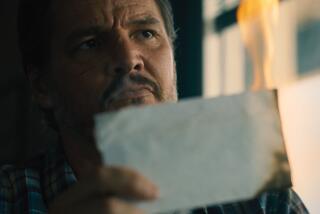LAUGH-TRACK CINEMAGOERS : Too Many Guffaws Pierce the Sanctity of the Movie Theater
- Share via
The movie theater has always meant dark magic to me. A place, ideally, where the huge, grainy details of truth rub against the colossus of experience. A place that excludes the outside world and all its jittery static, a celluloid haven from the hiccups of life.
But I’m afraid that the whole wonderful thing is falling apart.
My cherished retreat is no longer safe. Not just because the film industry manages to produce fewer and fewer pictures of merit, but because audiences no longer honor the medium on those rare instances when it deserves quiet attention.
The spoilers are here. The ones who pierce the sprawling blackness with their rude guffaws. The ones whose laughter in the dark has less to do with Nabokovian irony than with seemingly unprovoked outbursts for their own sake.
Understand, they don’t intend harm. It’s just that they’re unaware of an opposite sensibility, the kind requiring a little concentration, not participation.
Take the other night, for example. I went to a sneak preview of “Crimes of the Heart.” It was a West Side theater, one that shows foreign films and select Hollywood fare to presumably sophisticated patrons. Within the first few minutes, a couple behind me began punctuating the dialogue with loud, short laughs.
Every time Sissy Spacek or Jessica Lange or Diane Keaton uttered a mildly whimsical line from Beth Henley’s screenplay (an adaptation of her Pulitzer Prize-winning work), this couple erupted into double syllable vocals.
Chick (Tess Harper) natters away at Lenny (Keaton) while wriggling into her panty hose. “My, these are snug,” she says. “Are you sure you bought my right size?” Looking at the box, Lenny answers: “Size extra petite.” Chick retorts, “Well, they’re skimping on the nylon material.”
Nothing really worthy of more than an inner chuckle. Nor was the sight of Lenny frantically trying to lodge her birthday candle into a hard, crumbly cookie exactly riotous--just endearing.
Playwright Henley was not trying to set up a howler, but merely to weave the fragile thread of her characters’ voices. By God, they were unmistakable. And it goes without saying that this is a feat all too rare in a day when scripts-by-collective, not auteur , are the rule. But the laughers took their cue to convulse noisily here, too, ruining the chance to let the effect settle.
I changed my seat two more times and, later, puzzled over the phenomenon that proved so intrusive. How to explain these knee-jerk chortles when a smile would do? The material hardly seemed hilarious.
Rather, it was an off-handed hodgepodge of interaction, sometimes a little sardonic, sometimes a little confessional or embarrassed, but mostly the Deep South simple talk that refuses to stand up like so many proud puns. It was a kind of connective tissue between people, their way of laying out tentative, half-formed notions of myth and reality, their own kind of furtive poetry.
These were not distinct one-liners, like Neil Simon’s, or even the gut-thumping gems I remember in a picture like “Where’s Poppa?” where outrageous humor comes vaulting into your lap. But then I realized that the misplaced-laugh syndrome afflicts a lot of movies. The subtitled “Decline of the American Empire,” with its highfalutin’ philosophizing on sex, drew the same response for even less humor--and this from an industry audience at a studio screening.
Gradually, it occurred to me that I’d heard this kind of laughter before. It was the canned variety that accompanies TV sitcoms--those series where you can almost see an engineer hitting the laugh-track button. This strategy is so horridly contrived and hateful, in fact, that I’ve never been able to sit through more than a few minutes of “The Cosby Show” or “Family Ties.”
But TV style is insidious. If program arbiters even inflict a disco track onto the sports news--does it bother anyone but me to watch the UCLA Bruins ripping down the court to superimposed rock rhythms?--there’s no telling where they’ll draw the line.
Worse, audiences have been subliminally contaminated. Where there’s no laugh track, they supply it. Some of us can’t help feeling resentful, though, to see our movie sanctuary overrun by a boob-tube mentality.
And now that audiences have been programmed to laugh on cue, just like their recorded counterparts, what’s next? Will there be no refuge for artistic objectors? Have we seen the last pleasurable picture show?
More to Read
Only good movies
Get the Indie Focus newsletter, Mark Olsen's weekly guide to the world of cinema.
You may occasionally receive promotional content from the Los Angeles Times.










